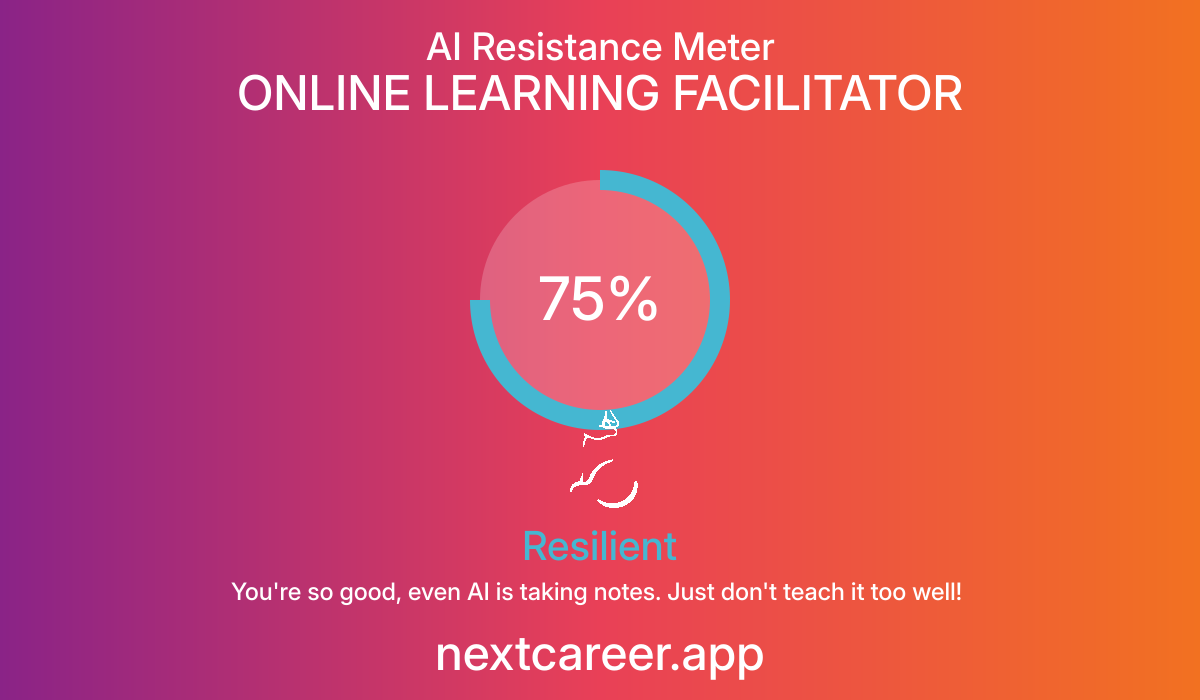AI Resistance Analysis
ONLINE LEARNING FACILITATOR
ONLINE LEARNING FACILITATOR
AI Resistance Score
AI Resistance Meter
Resilient
ONLINE LEARNING FACILITATOR
You're so good, even AI is taking notes. Just don't teach it too well!
The role of an Online Learning Facilitator is relatively resilient to AI advancements primarily due to the unique blend of cognitive tasks, emotional intelligence, and creative delivery needed to engage diverse learners. While AI can handle some aspects of instructional design and content delivery, the human elements of facilitation—like responding to individual student needs and fostering community—are more challenging for AI to replicate effectively.
The role of an Online Learning Facilitator is relatively resilient to AI advancements primarily due to the unique blend of cognitive tasks, emotional intelligence, and creative delivery needed to engage diverse learners. While AI can handle some aspects of instructional design and content delivery, the human elements of facilitation—like responding to individual student needs and fostering community—are more challenging for AI to replicate effectively.
Key Factors
- Cognitive Tasks: While AI can assist in content curation and provide data insights, the deeper cognitive engagement required to foster student understanding and co-create knowledge remains a human-centric task.
- Emotional Intelligence: The online learning environment often needs nuanced emotional support and relationship building which AI cannot replicate at a human level. Facilitators must read emotional cues and adapt accordingly.
- Physical Skills: Facilitation does not require significant physical skill; however, the ability to navigate tech platforms and engage with multimedia content fluidly is essential.
- Creative Thinking: Innovative course design, problem-solving in teaching strategies, and creating engaging learning experiences require creativity that is still predominantly human in nature.
Human Advantages
- Ability to build rapport and connectors among students fostering a supportive learning community.
- Responding dynamically to the emotional and motivational needs of learners, which aids in retention and engagement.
- Creative approaches to problem-solving and course adaptation in response to unforeseen challenges.
AI Vulnerabilities
- Standardized content delivery could be automated by AI platforms, making the facilitation role less differentiated.
- AI could provide real-time analytics on student performance, which could diminish the perceived necessity of human facilitators in some contexts.
Recommended Actions
- Invest in continuous professional development to enhance emotional intelligence and community-building skills.
- Embrace AI tools as collaborative partners rather than competitors to enhance the learning experience; for example, using AI for personalized feedback while humans provide emotional support.
- Focus on developing strong communication and presentation skills to create an engaging online learning environment that differentiates from an AI-only approach.
In the near term, Online Learning Facilitators will likely see enhanced collaboration with AI tools to provide rich analytics and personalized content, rather than outright replacement. Over the long term, as AI continues to evolve, facilitators who can integrate these tools into a cohesive learning experience will become increasingly valuable. There's a potential shift towards blended models that amplify human and AI capabilities, rather than opposing them.

Why Calculate AI Resistance?
Understanding how AI-resistant your career is becoming increasingly important in today's rapidly evolving job market. Our analysis combines multiple factors including required human skills, technological adaptability, and future industry projections to give you a comprehensive view of your career's sustainability.